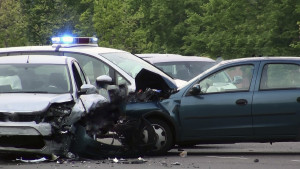
If you drive in Phoenix, AZ, you already know all too well that it’s a dangerous town to maneuver in. Vast urban sprawl and lengthy commutes mean a lethal mix of high-speed driving combined with stop-and-start traffic, and statistically speaking, even if you’re a considerate driver, sooner are later you’ll probably be involved a car accident.
To add even further insult to injury, in a recent article on Yahoo! Autos entitled “Poor People Are More Likely To Die While Driving Than Ever Before,” Editor-at-Large Alex Lloyd presents some startling statics showing a correlation between income and education inequality, and a significant rise in the chance of dying in a vehicular-related accident. Lloyd makes the point that while safety technology does eventually trickle down to lower-end car models, we’re actually only at 95 percent penetration for cars with front airbags even though automakers began installing them in automobiles some 30 years ago.
According to an article in the Arizona Republic,144 people have already been killed in traffic accidents on state highways this year – a 35 percent increase from last year – triggering a DPS crackdown in an attempt to slow the grim situation on our roads.
What You Can Do to Help Protect Yourself and Your Family
As noted by many police officers, the oldest piece of safety technology is still one of the best: the seat belt. Buckle up, every time – and make sure your friends and family abide by the same rule – and your chances of surviving an accident are greatly enhanced. Aggressive driving and speed are often noted as a causes of carnage, especially in males, a behavior modification that is much better remedied by leaving for work or appointments earlier and tactical route planning than the consequences of speeding tickets – or an accident. For your teen drivers, a discussion of no texting and driving should also be mandatory.
Some Powerful Sociological Implications
As another national election cycle looms large, the topics of income and education inequality among Americans will no doubt be a part of the issues that our prospective candidates debate as we decide the next direction for our country. Transportation – and access to other modes of transit – play such a critical role in the growth and vibrancy of cities like Phoenix where most people use cars to get to work. In fact, voters in town recently approved Proposition 104, a $31.5 billion, 35-year transportation plan, which uses an extended and increased sales tax for highway, bus and light-rail improvements. While not widely used in the valley of the sun, this long-term vision for public transportation and alternate modes of travel benefits the people who need it the most: people without vehicles, students, folks with disabilities and seniors for example.
The education and income inequality debate is obviously a microcosm of the complex issues that continue to vex our country on a much grandeur scale. Instead of the burden of crippling student loans, should higher education be more affordable – and accessible to all Americans? And in regard to vehicle safety standards, should organizations like the National Highway Safety Institute (NHTSA) reexamine safety standards for all cars – providing the needed protection for the rich and poor alike.
